Concerning Breakfasts: A Brief History and Typical Fare - 1921
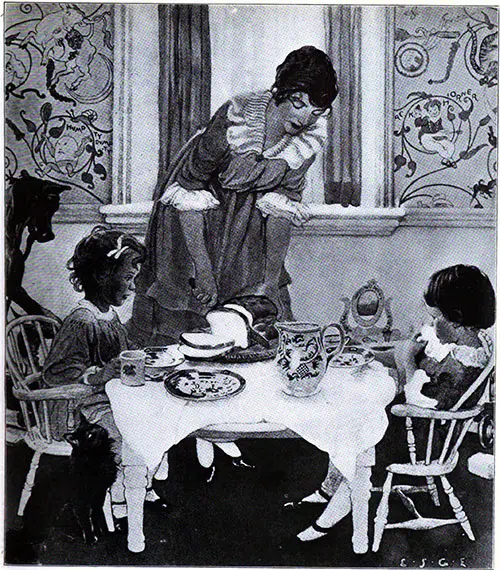
By Alice E. Whitaker
A certain Englishman who breakfasted with the Washington family in 1794 wrote of the occasion: "Mrs. Washington, herself, made tea and coffee for us. On the table were two small plates of sliced tongue and dry toast, bread and butter, but no broiled fish, as is the general custom."
However sparing the mistress of Mt. Vernon might have been, it was the usual custom in old times to eat a hearty breakfast of meat or fish and potato, hot biscuits, doughnuts, griddlecakes and sometimes-even pie was added. A section of hot mince pie was always considered a fitting ending to the winter morning meal in New England, at least.
When Charles Dickens was in the United States, in 1842, he stopped at the old Tremont house in Boston. In his "American Notes," which followed his visit to this country, he wrote critically of the American breakfast, as follows: "And breakfast would have been no breakfast unless the principal dish were a deformed beefsteak with a great flat bone in the center, swimming in hot butter and sprinkled with the very blackest of pepper."
For a time my household included a colored cook, who, according to local custom, went to her own home every night. Invariably before leaving she came to me with the short and abrupt question,
"What's for?" This experience taught me the difficulty of planning breakfasts off hand. More than one beginner in housekeeping wonders whether a light breakfast of little but a roll and coffee is more healthful than one of several courses.
It is an old American idea that luncheon or supper may be light, dinner varied and heavier, but breakfast must be wholesome and nourishing. This is based on the belief that it is natural for man and beast to wake up in the morning with a desire for food and unnatural to try to do the hardest work of the day with but a pretense at eating.
About twenty years ago [1901], there was much talk of the alleged healthfulness of going without breakfast entirely. For a time this plan was the object of much discussion and experiment by medical and scientific men and workers in general.
The late Edward Everett Hale was a strong opponent to abstinence from breakfast by brain workers, while those who labored with hand and muscle looked with little favor on the morning fast. Finally the no-breakfast idea went the way of most fads in food.
As a compromise between the extremes of going without any breakfast, and the old-time, over-hearty meal of several courses, there came into fashion the simple meal of fruit, cereal and eggs.
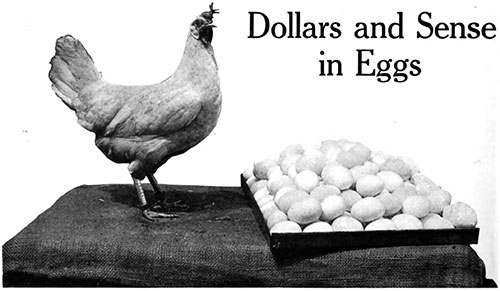
This is to be commended, if the egg, or its substitute in food value, is not omitted. Too often a sloppy cereal is washed down rapidly with a cup of coffee and called sufficient. Sometimes the ready-ta-eat cereal and the milk bottle left at the kitchen door include the entire preparation for the morning meal.
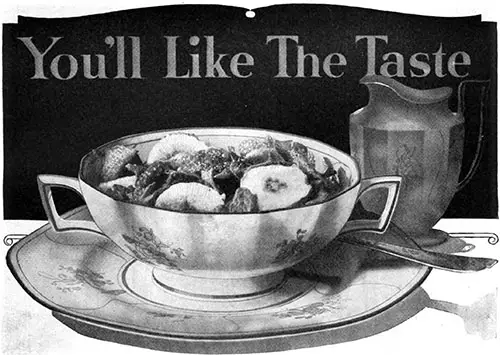
The adaptability of this quick breakfast, and its ease of preparation, keeps it in favor. But filling the stomach with a cereal, from which some of its best elements have been taken, means, for women folks at home, placing the coffee pot on the range to warm up the cup that will stop that "gone" feeling so common after a near-breakfast. The man at work might once have found solace in a glass of beer; now, perhaps, he smokes an extra cigarette.
It is well understood that children grow listless and dull before noon, when an insufficient breakfast is eaten. One who has breakfast leisurely at nine o'clock may be satisfied with a roll and a cup of hot drink, but a commuter with a trip ahead to office or shop, and the farmer who must make an early start in the day, cannot rely on light, quickly digested food in the morning. Their energy and working capacity will slow down long before noon.
Objection is sometimes made to a good, sustaining breakfast because of a distaste for food in the morning. In such a case, look to the quality or quantity of the night meal; it may be too heavy or indigestible.
Between a breakfast with warmed-over meats, and one without meat, especially if eggs are substituted, the choice should be given to the latter. Twice-cooked meats, however pleasing they may be to the palate, are not easy to digest.
They serve merely as a way to use left-overs, which good management will keep to the minimum. When selecting fruits for breakfast, the fact must not be overlooked that the starch of cereals and acid fruits, like a sour orange, often disagree.
When apples are plentiful nothing is better than this fruit when baked, but in cities the banana frequently costs less and it stands at the head of all fruits in food value. When perfectly ripe it has about 12 percent of sugar, but as it is picked green, the fruit sold in the markets is often but partially ripe and is more easily assimilated, if baked like the apple; it then becomes a valuable breakfast food.
It is a common mistake in a meatless breakfast to use too large a proportion of cereal. While the standard cereal foods, when dry, are from two-thirds to three quarters starch, with the balance made up of a little protein, fat, water, fiber and a trace of mineral matter, it should not be forgotten that while cooking they absorb several times their bulk of water, which reduces the food value of the product. Oatmeal and corn meal are best adapted for winter use because they contain a little more fat than wheat or rice, which are suitable for summer diet.
Eggs are the most available substitute for meat at breakfast and it is doubtful economy to omit them, except in times of extreme high prices. They are not essential in all desserts and saving in their use should begin at that point. Eggs may be cooked in many ways so that they need never become a monotonous fare.
All kinds of fish are an excellent substitute for meat, and, as prepared for the table, nearly equal beef and mutton, in the amount of pr0tein, which is the element missed in a non-meat diet, unless it be carefully planned.
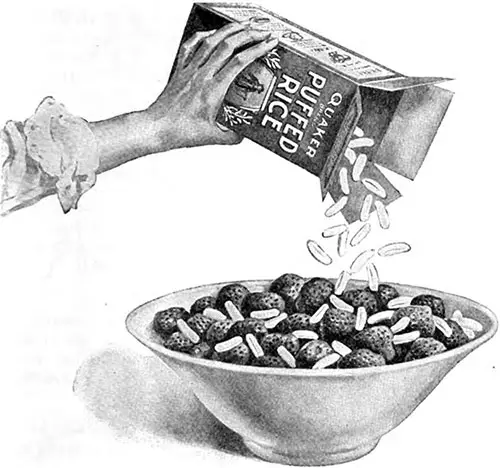
Breakfasts without Meat
The following are adapted to different seasons and the beverage may be selected to suit the taste.
- Strawberries, eggs baked in ramekins, oatmeal muffins.
- Fruit, cheese omelet, rice griddle cakes.
- Oranges, codfish balls, wheat muffins.
- Oatmeal, baked bananas, scrambled eggs, rice muffins.
- Cereal, hashed browned potatoes, date gems.
- Oranges, soft boiled eggs, Lyonnais potatoes, dry toast.
- Cereal with dates, whole wheat muffins, orange marmalade.
- Stewed prunes, French omelet, creamed potatoes, dry toast.
- ‘Grapefruit, broiled salt codfish, baked potatoes, corn muffins.
- Fresh pineapple, broiled fresh mackerel, creamed potatoes, French bread.
- Sliced bananas, omelet with peas, rusked bread.
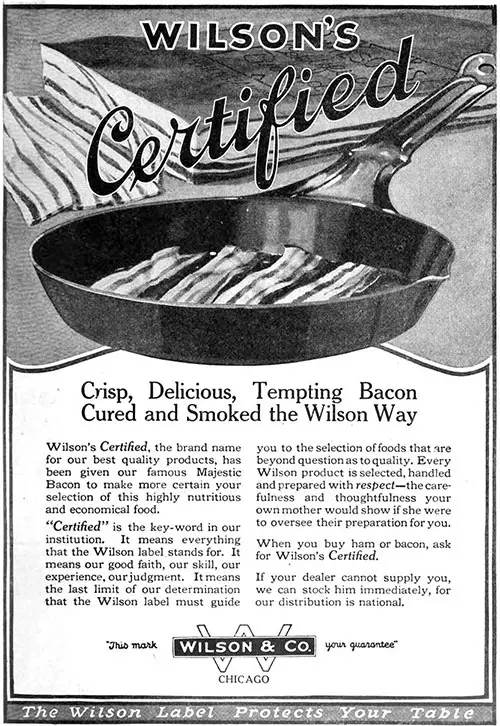
Breakfasts with Meat
- Fresh apple sauce, pork chops, stewed potatoes, graham muffins.
- Dried peaches, stewed, broiled honeycomb tripe, escalloped potatoes, reheated rolls.
- Fruits, minced mutton, potato puffs, rice griddle cakes, lemon syrup.
- Baked apples, baked sausages, hashed potatoes, corn cakes.
- Baked rhubarb and raisins, ham omelet, bread-crumb griddle cakes, caramel syrup.
- Melon or berries, broiled ham, shirred eggs, creamed potatoes.
- Oranges, broiled beef cakes, French fried potatoes, toast.
- Steamed rice, sliced tomatoes, bacon and eggs, rye muffins.
- Berries, broiled chicken with cream sauce, fried potato cakes, muffins.
- Cereal with syrup, scalded tomatoes with melted butter, baked hash, dry toast.
- Melon, veal cutlet, cream sauce, baked potatoes, corn bread.
Source: Alice E. Whitaker, "Concerning Breakfast," American Cookery, the Boston Cooking-School Magazine Co., Boston, Massachusetts, Volume 26, No. 4, November 1921 P. 284-286.
